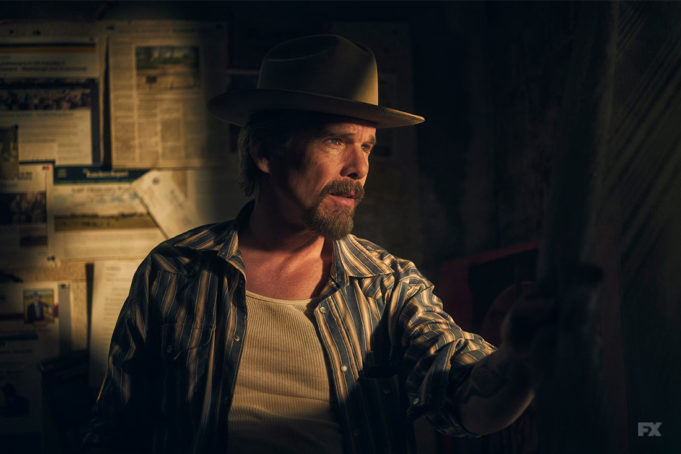We had a Pedro Pascal summer, and now it’s given way to an Ethan Hawke fall. (Everything he’s not in this season, fellow Texan actor Mckenna Grace is.) In just the previous two months, the Oscar-nominated movie star reprised his role as a serial child murderer in Black Phone 2 and gave perhaps the performance of his career in Blue Moon, and now he is the star of The Lowdown, a shaggy and likable series running on FX and streaming on Hulu that brings film noir stylings to the streets of Tulsa.
What I’ve come to realize from the Hawke-a-thon is that while the 55-year-old Austin native has played his share of heroes and villains, he’s better at playing guys who are weak or profoundly torn in some way, where he can make his eyes go all wide with fear and make you wonder whether he’s going to break for good or for evil. Think of how vividly he played the minister with existential doubts in First Reformed, the alcoholic gunslinger of The Magnificent Seven, the hapless kid brother in Before the Devil Knows You’re Dead, and even the bullied rookie cop in Training Day. He’s best when he has some desperation about him, and that quality is displayed to good effect in The Lowdown as a rare book dealer and “truthstorian” who is utterly terrified as he confronts a powerful Oklahoma family.
The show begins with the apparent suicide of Dale Washberg (Tim Blake Nelson), the closeted-gay rainbow sheep of his family, about a week after Lee published an unflattering profile of his family in a publication much like the Fort Worth Weekly. Despite this, Lee and some others don’t think Dale’s death from a close-range gunshot to the head is a suicide, because Dale used his veto power to block his family from doing so much business. Now that he’s gone, his brother Donald (Kyle MacLachlan) is free to run for governor of the Sooner State. As Lee finds incriminating notes from Dale in the pages of the dead man’s first-edition Jim Thompson pulp novels, the truthstorian is targeted by white supremacists, a mobbed-up construction company, and Donald’s personal fixer (Keith David), who’s less than enthused about the new friends his boss is making.
This series is created by Sterlin Harjo, the Seminole writer best known for co-creating and running Reservation Dogs, a previous FX/Hulu series also set in Oklahoma about a group of Native American teens. Harjo’s sense of humor seeps through the detective plot here, as Lee is kidnapped by gun-toting thugs in front of his bookstore, and everybody blames Lee for his own abduction. His bodyguard (Cody Lightning), who was employed to keep him safe, is incredulous: “Why the fuck did you get kidnapped, pedo? You’re a grown-ass man!”
The bodyguard also can’t understand why Lee objects to being called “pedo.”
Harjo means to make a commentary on white do-gooders like Lee, who knows that the Washbergs have ties to infamous Oklahoma crimes like the Osage murders and the Tulsa race massacre. However, it’s hard to disentangle the damage resulting from Lee’s good intentions from the damage resulting from his being a dumbass. Lee doesn’t know how to play it cool, so he royally pisses off Donald by confronting him about his business dealings in the men’s room at Dale’s funeral. Later Lee learns that Dale left an alternate will that bequeathed important Washberg land to an elderly Native friend (played by the late Graham Greene), and when Lee asks Dale’s alcoholic widow (Jeanne Tripplehorn) about the document, it leads directly to the old man’s murder.
The series has a gallery of tasty supporting characters: Lee’s teenage daughter (Ryan Kiera Armstrong), who does better detective work than him; the shady lawyer (Macon Blair) who is Lee’s landlord; the owner of a rival Black newspaper (Killer Mike) who occasionally employs Lee; and Lee’s former business partner (Peter Dinklage), who’s smarter than him but also profoundly self-destructive.
(Lee’s physical altercation with that ex-partner yields an important life lesson: Don’t fight a dwarf. Not only will you look like a bully, but the dwarf is probably the perfect height to punch you in the genitals.)
I write these words with seven of the series’ eight episodes having aired. By the time you read them, the finale will have dropped, resolving the cliffhanger with Lee in a Mexican standoff with the Native friend’s killer in a packed whites-only church. What’s clear is that Hawke holds together The Lowdown and its yarn about Lee’s shambolic quest for the truth, where he’s frequently armed with only his ability to tell stories, one of which name-checks Fort Worth and gets him out of a jam. As long as he’s our guide to the Okie corruption, we’ll follow him.












